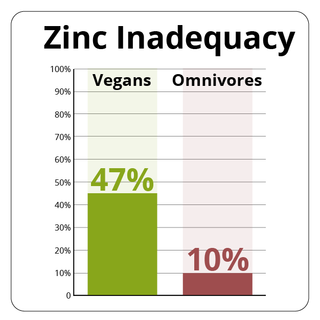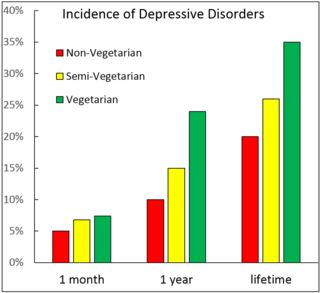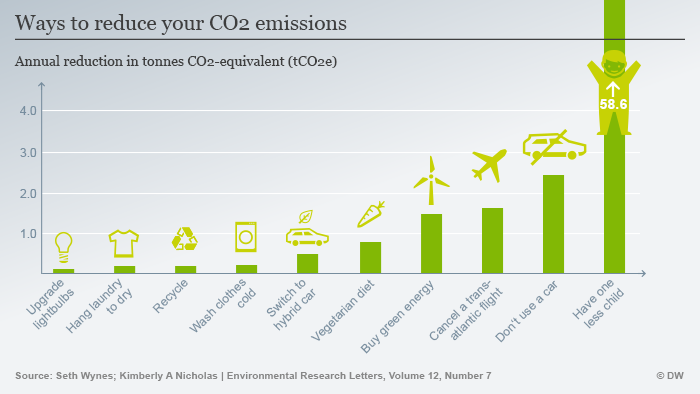Veganism and Mental Health

Veganism involves a plant based diet with no animal based foods. Some go vegan because of their love of animals, some go vegan because the animal grazing industry is one of the most damaging to our environment and some do it for health reasons. And it works for many. 40% of the Indian population is vegetarian. Furthermore, German, Iranian strongman Patrik Baboumian (Below) anecdotally demonstrated that meat isn’t needed to build muscle. This post hopes to unlock why veganism can be beneficial but also nutritionally deficient.

Veganism involves a plant based diet with no animal based foods. Some go vegan because of their love of animals, some go vegan because the animal grazing industry is one of the most damaging to our environment and some do it for health reasons. And it works for many. 40% of the Indian population is vegetarian. Furthermore, German, Iranian strongman Patrik Baboumian anecdotally demonstrated that meat isn’t needed to build muscle. This post hopes to unlock why veganism can be beneficial but also nutritionally deficient.
The physicians committee for responsible medicine (PCRM) have claimed that red meat is as dangerous to our health as tobacco as it increases the risk of cancer, heart disease and infertility. Meat also increases cholesterol and of course, body fat. In addition, fruit and veg includes a plethora of nutrients such as anti-oxidants, fibre and proteins. Vegetarians have a longer life expectancy and a lower likelihood to develop diseases than non-vegetarians. So the evidence seems clear. Vegetarians and vegans can live healthier than meat lovers. However, dieticians, food scientists and psychologists have recently put the vegan diet under the microscope.

The MAYO Clinic reviewed the vegan diet and highlighted deficiencies in vitamins B12, iron, calcium, vitamin D, omega 3 fatty acids and protein. Lack of these nutrients increases the risk of brain issues, bone health and anaemia. For example, plant based foods contains little to no vitamin A, which Is essential for vision, learning and memory. Instead, they contain carotenoids, which must then convert into retinol in order for our bodies to use it. Studies have also shown that vegans have lower levels of vitamin D3, which is needed for brain growth, and MK-4, which is needed for brain cell development. However, the most concerning deficiency among vegans and vegetarians is vitamin B12 or cobalamin. This vitamin is responsible for developing DNA, RNA, red blood cells and myelin, which protects the brain. Without this, the risk of developing a plethora of mental illnesses such as depression, psychosis and mania increases. A plant based diet also results in lower levels of iodine, iron and zinc. A Swiss study found that 47% of vegans had zinc inadequacy compared to only 10% of omnivores.

However, there is no need for vegans to panic as there are clever ways to still gain some of those essential vitamins. For example, natty (fermented soy) still helps the body convert K2 into MK-4 and omega 3 can be derived from algae such as flax or chia seeds. It should also be noted that there are supplements for many of these vitamins (which will end up costing the equivalent of meats), but the same levels cannot be met without animal based foods.

Another alarming statistic has risen in recent research for vegans and vegetarians. Independent studies in Britain, France, Germany, Finland and Austria have all found that vegans and vegetarians were more likely to have depression than omnivores. A longitudinal study found that 30% of vegetarian women had experienced depression within the year compared to 20% of non-vegetarian women. Therefore, it appears that vegetarians may live longer but they are at a greater risk of depression. So how could this be? While it is unclear, there are a few explanations. Firstly, lack of meat might alter brain chemistry or the microbiome. A more likely explanation would be correlations between being a vegan and certain traits. For example, depression is twice as likely for women and there are more female vegans. Vegetarian diets can also be isolating as nobody wants to invite the vegan to the dinner party. However, it should also be noted that there have been three studies that found no relationship between veganism and depression.

So evidence is leaning towards the vegan and vegetarian diets resulting in living longer but perhaps at the cost of a lower quality of life. However, I want to emphasise that being aware of the limited nutrition through supplements and the increased risk of depression will cancel out these effects. Then, there is the environmental argument. As we farm animals for meat production at a level higher than ever before, we create higher levels of carbon emissions, which then leads to global warming. Further arguments also include overgrazing, which leads to deforestation. However, it’s important that we think critically here. It has become trendy that people are going vegan to help the environment but they then follow other trends such as travel. This is insanely counterproductive because one flight is far more detrimental to the environment than someone having a carnivore diet. So be weary. You are helping the environment if you give up meat but if you really care, lower your energy consumption on technology and fly less. These are far more effective ways of helping the environment. You don’t need to prove to people that you’re helping the environment by posting an avocado salad on instagram. You just need to do practices that actually help.

Now some of you are probably wondering why is veganism being discussed on a mental health blog. Stick to what you know. Firstly, we wanted to discuss the nutritional benefits and limitations of going on a vegan diet but what is also important to emphasise is the social arena of veganism. An ill-mannered joke is that the first rule of vegan club is tell everyone you’re a vegan. If you tell others you’re vegan, you are demonstrating how others can take action. However, people can get lost in their message and end up identifying too strongly with the label. This then leads to an us vs them (non-vegan) culture and a need to show your veganism through social media; An ideal self or a portrayal of someone you’re not. The truth is a vegan diet is difficult because people don’t always have the time or money to cook a plant based meal rather than a processed ready-made meal. Consequently, if veganism is important to you and it represents your values, stick to it but don’t feel ashamed if you break it. Nobody is perfect.
In conclusion, the vegan diet is commendable and has its benefits. If it’s done alongside nutritional supplements, looking after your mental health, and a lack of attachment to trying to change the world, you can reap its benefits. If it works for you, great! But be weary or better again, be educated!
Yours Sincerely,
The Motus Movement.